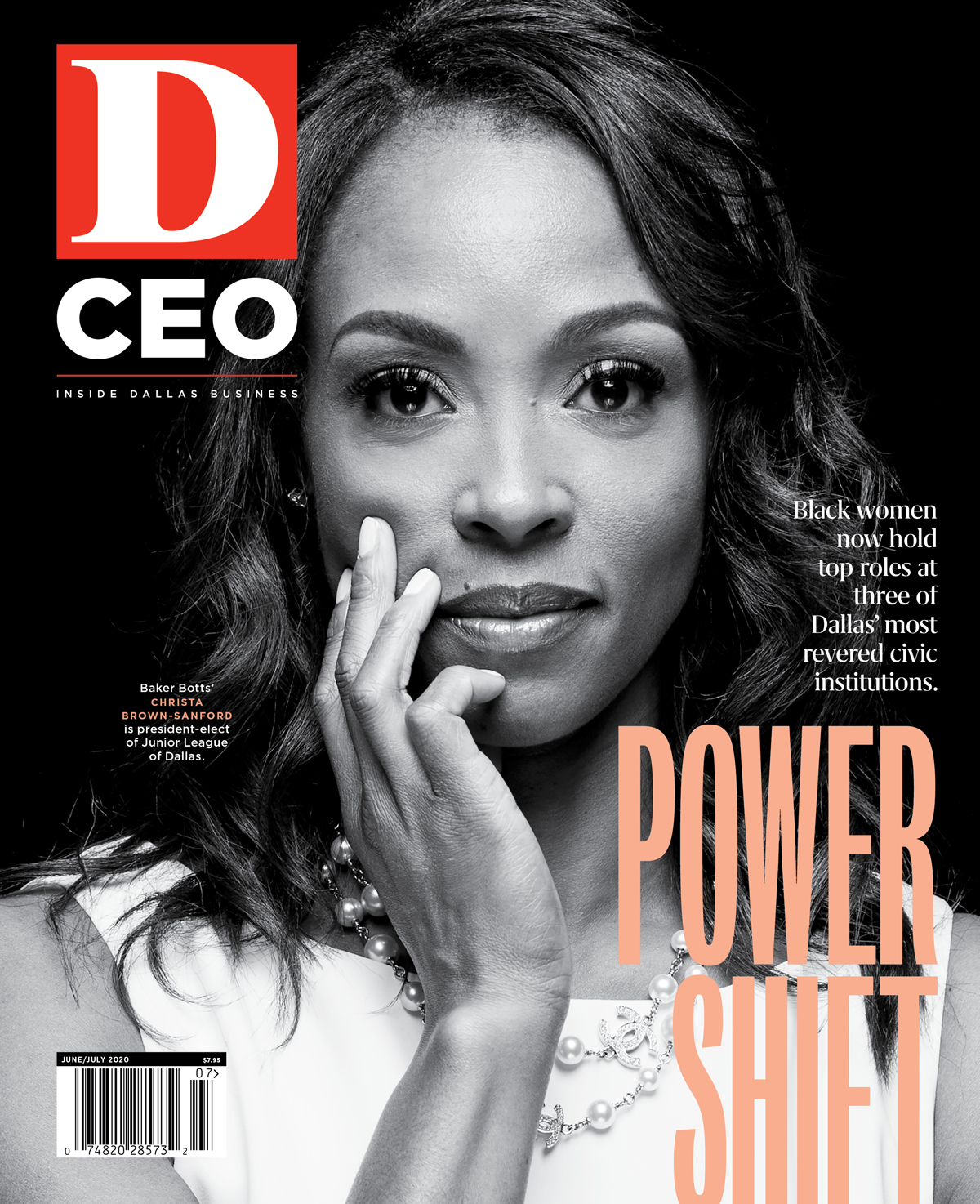During a job interview for a supervisory position in the 1970s, Lin O’Neill remembers being taken aback by the personal nature of some of the things she was asked. “The first question out of the vice president’s mouth who was interviewing me was, ‘And what kind of birth control do you use?’” O’Neill says. She went on to manage more than 1,000 employees and $60 million in catering contracts for the Los Angeles base of an airline. Still, her promotional opportunities were stymied because of her gender. “My boss used to pat me on the arm and say, ‘O’Neill, you do such good work. If you were a man, we’d make you a director, or even a vice president.’”
O’Neill got the VP title when she transitioned to Continental Airlines in 1982. Three years later, she relaunched a consulting business she had previously formed, and has run her own company ever since.
Only a few of the region’s large corporate giants are led by women, but North Texas has a rich history of supporting female entrepreneurs. The city’s first capitalist was a woman (see page 76), and late icons Mary Kay Ash and Ebby Halliday were pioneering forces.
Last year, Chief Executive Officer magazine named Texas the best state in the country for entrepreneurs—for a 15th consecutive year. Fit Small Business ranked the state No. 1 for women entrepreneurs, in particular. Local numbers are encouraging, too, with census data showing a doubling of local women-owned enterprises from 2000-2012 and a Forbes report ranking Dallas No. 1 for average sales per women-owned business.
And the city’s startup culture is diversifying, says Michelle Williams, an executive director at the Dallas Entrepreneur Center Network. “A lot of the stories that are being promoted to the front five years ago were mainly men in their late 30s or early 40s who were launching big tech firms or something that was shiny and new,” she says. “Now, we’re seeing a conversation that’s a little bit more diverse, in both industry as well as gender representation.”
Women entrepreneurs continue to battle sexist stereotypes, though. And nowhere is that more apparent than in private equity and investor pitch rooms.
An Age-Old Battle
When Valerie Freeman launched Imprimis Group about 40 years ago, securing a loan and a line of credit was nearly impossible. “Women had to build up that credibility,” she says. “[Our prospects] thought [women business starters] were going to go get married and have kids, and that would be the end.” Freeman eventually had to go with her male accountant to his bank to get financing. “I wouldn’t have gotten it otherwise,” she says.
She expanded her enterprise by launching a software company called BravoTECH and a marketing firm called Freeman+Leonard. More recently, in 2014, she again faced sexist stereotypes when raising funds for another add-on, Prime Women Media, a company that creates content designed for women over 50. Her team paid to pitch a group of male investors; they gave Freeman’s team a slot on an election night when the room was practically guaranteed to be empty. The sole investor who did express interest in Prime Women Media never followed up.
Freeman’s group eventually turned to 17 women angel investors to get the funding they needed for their new venture. “We started working our networks, and we ended up with these women that invested in us individually,” she says.
It’s not a new problem. Female entrepreneurs say there are deep-rooted institutional biases when it comes to securing funding for their enterprises. The data supports this. According to Fundera, 40 percent of U.S. businesses are women-owned, but just 7 percent of women receive venture funds for their startups. One challenge is that women make up only 4 percent of investment sector leaders, according to Harvard Business Review. Women-owned private equity firms, such as Austin’s True Wealth Ventures and New York’s Golden Seeds, are attempting to close the gender gap, but it’s a wide divide.
Connecting with female-led investment firms is one way for women business owners to get capital to launch their businesses, especially if they operate in traditionally male-dominated STEM spheres. “It’s relatively easy for women to get funding in things like retail and service-based industries because that kind of fits in people’s heads,” says Williams of the Dallas Entrepreneur Center Network. “But, when you start pivoting outside of that into the sciences, that’s when you see a lot of those biases come in.”
Lea Ellermeier, a Dallas entrepreneur behind Lingualcare and two other dental tech companies, recalls an investor meeting that ended with a discussion about local nanny services. “I was just sitting there thinking, ‘I bet you did not have this conversation with the last guy who was in here,’” she says.
Other stereotypes came into play as well. “It was harder to raise money because there was always an expectation or the assumption that I wasn’t going to work as hard as that 25-year-old guy in the hoodie,” Ellermeier says. She found the capital she needed by reaching out to foreign sources. “My first big investor was this gentleman in Germany, who took a risk on Lingualcare because he was used to investing in women,” she says.
After Lingualcare sold to 3M in 2008, Ellermeier became CEO of U.S. operations for Replicate Dental Technologies, an implantology company that was making its way through the FDA approval process. With its parent company in Germany, the majority of Replicate Dental’s funding originated in that country. More recently, Ellermeier has shifted attention to her latest venture, 2C Dental Technologies.
Doing It For Themselves
Other women, in an effort to meet financial needs yet still maintain control over operations, are taking funding matters into their own hands. Teresa Mackintosh, CEO of Addison-based software company Trintech, had a positive capital experience in the tech sector but emphasizes the proactive role she took in researching investors.
Mackintosh was named to lead Trintech after 16 years with Thomson Reuters and four years with a tax and accounting software group. When looking to take on investors, she extensively vetted potential private equity firms, connecting with fellow CEOs in the tech sector to gain insights and combing through portfolios with a critical eye. “Women can feel like we are lucky to be receiving money and investments, versus our expectations that we’re bringing something of value to the table, and [investors] should be vying for that opportunity,” Mackintosh says. “An entrepreneur should be just as selective about who they are accepting money from as the investor is selective.”
Poo~Pourri founder Suzy Batiz also took matters into her own hands. Wanting to avoid the pressures of obligations to others, she launched her innovative air-refreshment brand in 2007 entirely on her own, putting in an initial $25,000 and negotiating longer terms with vendors to stay afloat during the early days.
“It is control in one way,” she says. “But it’s more that-—I can maintain the values, and I don’t have any outside influence.” Thirteen years and another brand launch later, Batiz and her children still own 100 percent of her roughly $500 million enterprise, despite the many acquisition and investment offers.
Although the startup infrastructure in Dallas has come a long way and the city remains one of the best environments for entrepreneurs in the country, funding challenges beg consideration of just how many cracks in the glass ceiling have been made. “I do think there has been some progress, but I don’t think it is noteworthy,” O’Neill says. The increasing visibility of successful women entrepreneurs can help create momentum and be an effective tool for changing attitudes, says Ellermier: “Seeing more and more examples of women being successful in the workplace helps us all.”
Resources and Support
- The Dallas Entrepreneurship Center Network. The DEC provides networking and fund sourcing for local entrepreneurs, connecting business starters with local accelerators, mentors, events, and resources.
- Dallas Innovates. The site’s funding page maintains an ongoing list of capital sources, compiled by the Dallas Regional Chamber. Sources include angel investors, family offices, and venture capital and private equity firms.
- Texas Woman’s University—Center for Women Entrepreneurs. The Denton university provides funding, networking, training, and business advice to both established women entrepreneurs and those starting out.
- Texas Women Ventures Capital Management. This group of private equity funds supports women-owned and women-led businesses with revenue between $10 million and
100 million.






